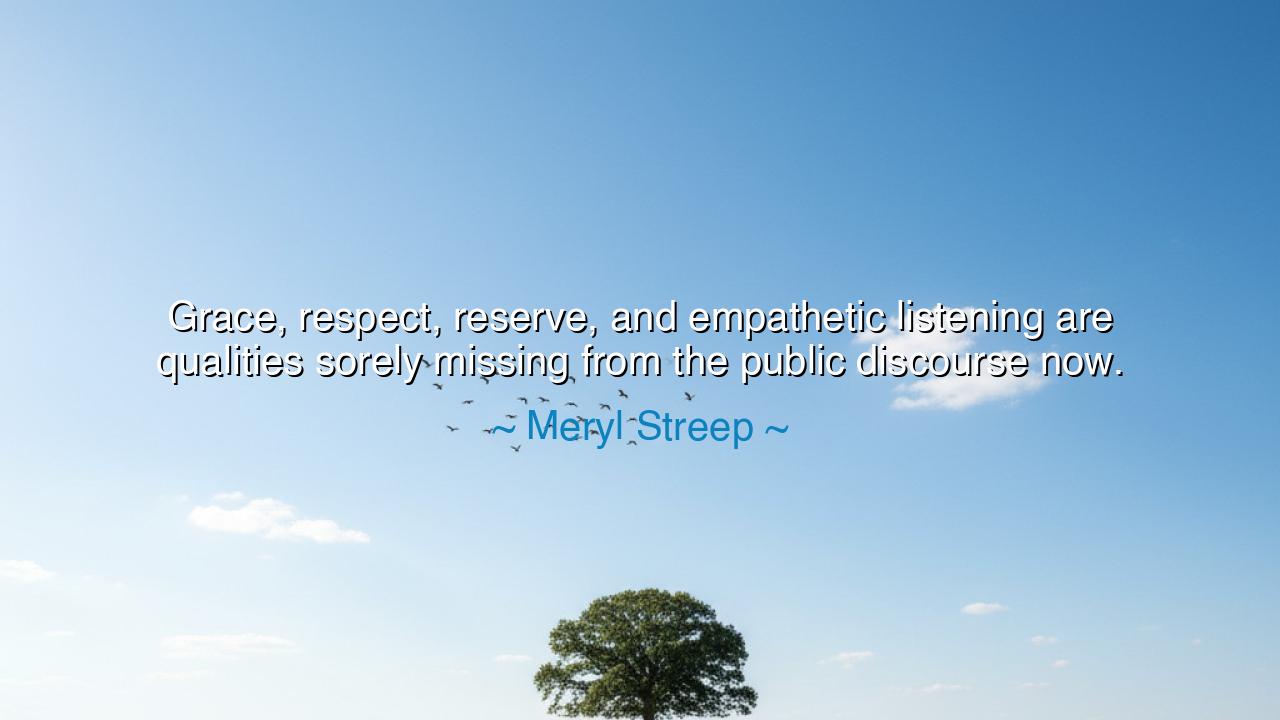
Grace, respect, reserve, and empathetic listening are qualities
Grace, respect, reserve, and empathetic listening are qualities sorely missing from the public discourse now.






Meryl Streep, a voice of wisdom clothed in the art of performance, once lamented the decline of our common spirit with these words: “Grace, respect, reserve, and empathetic listening are qualities sorely missing from the public discourse now.” This is not the voice of an actress alone, but of a seer gazing upon a troubled age. In her words lies a summons: that the noblest virtues, once the pillars of human conversation, have been forgotten in the clamor of anger, pride, and division.
The first of these virtues is grace—that gentle strength which turns conflict into understanding and bitterness into reconciliation. Grace is not weakness but a quiet power, a nobility of spirit that does not strike back when struck. In ancient times, the Stoics spoke of enduring insult with dignity, and the early saints counseled the same. Where grace is present, discord softens; where it is absent, even small quarrels become wars.
Then comes respect, the acknowledgment of another’s dignity, even when their words or ways differ from our own. Without respect, conversation decays into mockery and contempt. Respect is the soil in which peace grows, for when each person honors the worth of another, truth can be sought together rather than wielded as a weapon. History teaches us that where respect fails, hatred is sown. The fall of many empires began not with swords, but with the erosion of respect among their people.
Reserve follows, the discipline of holding back, of weighing words before they are unleashed. The ancients knew the power of silence. Solomon declared that even a fool seems wise if he keeps quiet. In times of heated discourse, reserve is the shield that prevents words from becoming arrows that cannot be recalled. It is the stillness before speech, the pause that allows wisdom to enter. Without it, public life becomes a battlefield of unmeasured words.
And lastly, empathetic listening—that rare art of hearing not only the words spoken, but the heart behind them. To listen with empathy is to enter the world of another, to see through their eyes, to feel their wounds. This virtue is the bridge over which understanding travels. Consider Abraham Lincoln, who during the Civil War was known to sit with both allies and adversaries, listening deeply. By listening, he earned the trust even of those who despised him, and through it, he guided a nation through fire.
Meryl Streep’s lament is thus a call to restoration. She names what is lost so that it might be found again. For in this age, where voices shout but few truly hear, where insults spread faster than reason, we risk forgetting that discourse is not war but communion. When grace, respect, reserve, and empathetic listening vanish, what remains is noise, and from noise comes division, and from division comes ruin.
O children of tomorrow, take this teaching to heart. In your own life, cultivate these four virtues. Show grace when wronged. Offer respect even when you disagree. Practice reserve in your speech, choosing words as carefully as a craftsman selects his tools. And above all, listen with empathy, for in listening you grant dignity and open the door to peace.
The lesson is clear: the survival of harmony in families, in communities, and in nations depends not on louder voices, but on better hearts. Let Meryl Streep’s words be not a lament alone, but a challenge. Live them, and you will become a beacon of light in the darkness of discourse, proving that the old virtues are not lost, but alive in those who choose them. For only by these virtues can human speech become once more a path to truth, rather than a weapon of division.






AAdministratorAdministrator
Welcome, honored guests. Please leave a comment, we will respond soon